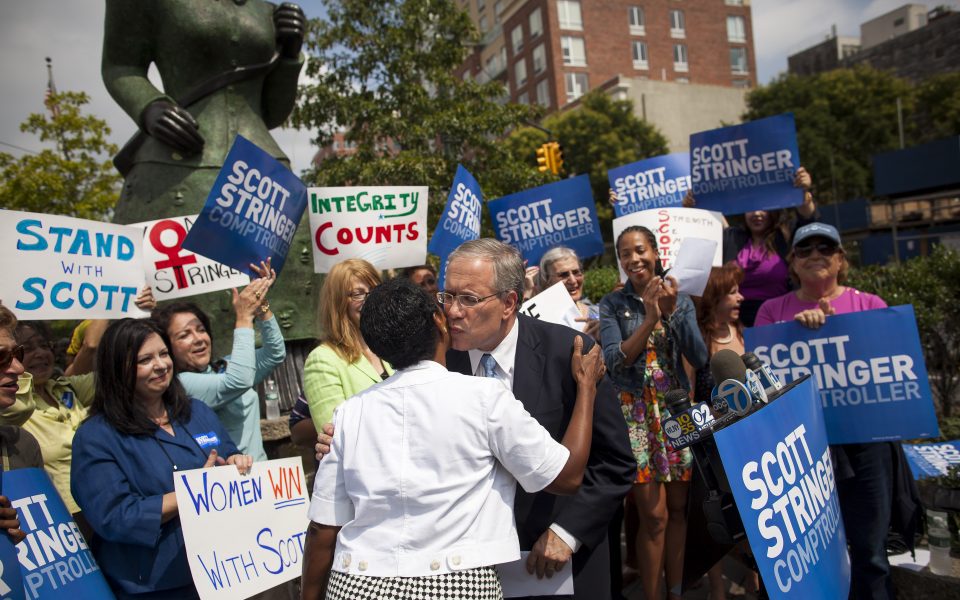Why sexual misconduct is unforgivable but corruption is overlooked

A year ago, if you had asked anyone who has spent time around New York City politics who would next become mayor, you were likely to hear that the election of Scott Stringer was more or less assured. Ranked-choice voting would probably favor him. A lifelong public servant, a son of Washington Heights, a wonk, an advocate — fighting for housing justice and climate justice and all the justices — he seemed like a pot roast on a damp night in midwinter: satisfying, if not abundant in memorable flavor.
It was hard to foresee that the kind of candidate who could brag about having “fixed the back office” of the city’s pension fund would find himself engulfed in scandal, and yet here we are. As the city’s comptroller, Stringer had spent the past seven years rooting around in the mess of bureaucracy, issuing audit after audit, finding waste here and inefficiency there. In 2016, for example, his office uncovered that the city was spending $400,000 a day on hotel rooms for the homeless; two years later, that “a shocking 27% of commercial waste vehicles have been issued at least one red light camera violation.” A Stringer mayoralty, as one friend recently remarked, would provide a daily streaming of “competence porn.”
Charisma, as the Trump era reiterated, allows people to overlook a litany of political sins. Among contenders in the Democratic mayoral field, Stringer had already been losing ground to Andrew Yang, he of bodega illiteracy, when a woman came forward late last month with accusations of sexual impropriety.
Jean Kim, who volunteered on Stringer’s unsuccessful campaign for public advocate 20 years ago when she was 30, said that during that time, when both were unmarried, Stringer kissed her and groped her and tried to pressure her into sleeping with him, exploiting his stature in politics, when she was not interested. Stringer, in turn, has denied the allegations, arguing that their involvement had been “light” and consensual. Kim and her many vocal allies view the interactions as assault.
Whatever the truth, the judgment was swift. Stringer’s eventual defeat began to seem much more of a foregone conclusion, the result of a mindset among many Democrats, particularly young ones, who regard sexual misdeeds as unparalleled in terms of their severity and demand for obliterating consequence.
The most recent mayoral poll, of more than 1,000 Democratic voters, the first to be conducted after Kim’s allegations, had Stringer’s support dropping by 5 points, with Yang in the lead and Eric Adams, Brooklyn’s borough president, essentially in second place.
A decade ago, when Adams served in the state Legislature, as chair of the Senate Racing and Wagering Committee, he appeared on the radar of the state inspector general’s office for his involvement in the selection of a slot machine operator at the Aqueduct Racetrack in Queens. The company initially chosen — and then ultimately rejected after public outcry — had offered a bid $100 million below its competitors’ for the licensing fee.
The 308-page report produced by the inspector’s office concluded that Adams had given investigators dubious testimony about the process, accepted campaign money from the operator first selected and then showed up at a celebratory dinner in which the company toasted its winning bid. Like Stringer, he has never been charged with anything; each has denied any lapses in ethical conduct. But the paths of the two candidates diverge in the way that these old allegations around Adams, more deeply substantiated, have appeared to have no effect on his current standing in the race.
As it happens, corruption — real or insinuated — is often hard for ordinary people to understand, while for so many women, the abuses of men are all too easily pulled from the archives of personal recollection. Amid companion crises in the Cuomo administration, for example, the sexual misconduct allegations against the governor upstaged the efforts on the part of his office to obscure the death toll in state nursing homes.
Four years ago, an article in the Annual Review of Political Science looked at voter response to corruption charges in democratic elections around the world and found that “voters keep reelecting politicians who steal from them.” Even when corruption is obvious, people are often willing to overlook it when weighed against other variables. Two years ago, Jasiel Correia, then a young mayor of Fall River, Massachusetts, who was facing federal bribery, fraud and extortion charges, managed to be recalled and reelected on the same day.
Stringer’s situation is particularly striking, given that he won the race for comptroller eight years ago as the candidate of choice among young feminists who were not about to raise their Champagne flutes for Eliot Spitzer, forced to leave office in 2008 because of his dalliances with prostitutes. At a fundraiser for Stringer in Chelsea, late in the summer of 2013, there were Vogue editors and Lena Dunham out to show their support, improbably enough, for a candidate described by Women’s Wear Daily as an “avuncular man who has the countenance of an Upper West Side accountant.” They had been corralled by Audrey Gelman, his press secretary, who would go on to rise and fall as the founder of the women’s coworking space, the Wing.
Now, though, young women — especially those occupying prominent political positions on the left — are abandoning Stringer. Among the first to rescind an endorsement was a close friend and ally, state Sen. Jessica Ramos, 35 years old and elected in 2018, who maintained in a statement that after Kim “came forward to share her truth,” it was “our duty to listen.” Soon the Working Families Party vacated Stringer’s camp as well.
But despite the aura of finality around his campaign, there is another truth. Young voters are notoriously loath to turn out in local elections. Data from a few recent races in New York indicates that Democratic women between the ages of 18 to 34 are less likely to show up at the polls than voters older than 40 — even when a dynamic, young female candidate presents herself.
Three years ago, in the primary that sent Alexandria Ocasio-Cortez to Congress, women in that cohort turned out at a rate of only 7%, nearly half the proportion of those older than 40 who voted.
More concerning than anything else in this election cycle is the extent to which so many New Yorkers remain oblivious to the particulars of the mayoral race at a moment profoundly critical to the city’s future. People who several months ago might have been able to predict the outcome of the Georgia Senate runoffs in Lamar County to one-tenth of a percent have little ability to differentiate among the candidates beyond viral details like Stringer’s harassment allegations, Yang’s goofy levity and Shaun Donovan’s limited understanding of the Brooklyn housing market.
Regardless of whether the accusations against Stringer and Adams prove spurious or damning, one thing is true, at least for now: Two men accused of wrongdoing are ahead of women who are accused of nothing.
[This article originally appeared in The New York Times]






